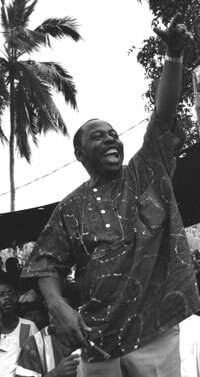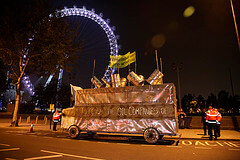It is genocide. I accuse the oil companies of practising racism because they do in Ogoni what they do not do in other parts of the world.
Ken Saro-Wiwa, 1993
 On November 10th 1995, Nigerian writer and campaigner Ken Saro-Wiwa and eight colleagues were executed by the then military government for protesting against oil companies’ destruction of their lands, water and health, chiefly Shell. They’d been arrested nearly 18 months earlier on trumped up charges, and despite huge international outcry, the kangaroo court proceeded and the men were killed. Platform’s campaign Action Saro-Wiwa demands that justice must be done in the cause that the men lost their lives for, and that 2015 is a pivotal moment to make this happen. Today, right now, Ogoni are mobilising to mark this anniversary and we hope to share footage of today’s events later in the week.
On November 10th 1995, Nigerian writer and campaigner Ken Saro-Wiwa and eight colleagues were executed by the then military government for protesting against oil companies’ destruction of their lands, water and health, chiefly Shell. They’d been arrested nearly 18 months earlier on trumped up charges, and despite huge international outcry, the kangaroo court proceeded and the men were killed. Platform’s campaign Action Saro-Wiwa demands that justice must be done in the cause that the men lost their lives for, and that 2015 is a pivotal moment to make this happen. Today, right now, Ogoni are mobilising to mark this anniversary and we hope to share footage of today’s events later in the week.
Shell’s legacy in the Niger Delta – once the breadbasket of Africa – is one of low environmental standards, pollution and appalling neglect. It has been enabled partly by racist legacies of British imperial rule. Ken became a powerful leader of the Ogoni. He was an eloquent and respected international figure, and an advocate of non-violence. He was the main author of the Ogoni Bill of Rights which asserted their demands, and also laid out an analysis of the systemic roots of the damage. This is a landmark statement that has galvanised dozens of small and indigenous communities worldwide. Yet since his murder Shell and the Nigerian government have done little to repair the enormous damage that has been done over decades to the oil-soaked, charred land and the oil-polluted water sources.
In 2011, the United Nations Environmental Programme (UNEP) released a report, ‘Environmental Assessment of Ogoniland‘ with the backing of the Nigerian government. This report contains detailed analysis and an equally detailed set of statements about what actions need to be taken to rehabilitate Ogoniland. Yet in the past four years almost nothing has been done to enable Ogoni to restore their livelihoods in farming and fishing, to live with fresh water and clean air, to have a future on their historic lands. This summer 2014, campaigners forced Shell to state for the first time that it had put aside the $1 billion that UNEP requires for the clean-up fund.
This is a step, but still Shell havers over taking action. It’s an international corporation. Make this happen.
In November 2015, it will be 20 years since Ken and the other men’s murders, and 25 years since the publication of the Ogoni Bill of Rights. Together with our allies and colleagues in Nigeria and elsewhere, we are giving Shell one year to act on the UNEP report –Shell must immediately sort out a secure mechanism for managing the clean-up funds; Shell must start implementing the UNEP action plan following a timeline that they publish; Shell must be transparent in their progress reporting and allow external parties to audit it.
Platform’s Action Saro-Wiwa is planning a year of actions including arts, youth, and cultural events to put Shell in the spotlight and leverage change. This includes a dramatic act of solidarity, which is to send the Battle Bus – the Living Memorial sculpture to Ken Saro-Wiwa – home to the Niger Delta.

Our colleagues there realise the electrifying potential of the memorial coming to Ogoniland:
“Bringing back The Bus will re-awaken the people and increase the sympathy people have for our struggle” Celestine AkpoBari, Social Action
“Nothing would have gladdened Ken Saro-Wiwa’s heart more than this show of solidarity with the suffering peoples of the Niger Delta” Nnimmo Bassey, Home of Mother Earth Foundation
Watch this space for how you can help The Bus get home to provide a fitting memorial and dynamic catalyst to justice in the Delta.
Saturday Dobee, Nordu Eawu, Daniel Gboko, Paul Levera, Felix Nuate, Baribor Bera, Barinem Kiobel, John Kpuine, Ken Saro-Wiwa
We remember you.